When considering the purchase of a motorhome, it’s important to consider the extraneous costs as well as the cost of the rig itself. In addition to things like maintenance, registration, and gas, you’ll also need to factor in motorhome insurance cost into your budget.
The fact that a motorhome is part vehicle and part house suggests that it could be quite costly to insure a home-on-wheels. After all, we’re driving a kitchen, living room, and even a plumbing system down the road. Moreover, many of us carry most of our personal possessions in our motorhome, especially full-timers like us.
But how much does motorhome insurance really cost? You might be surprised by the answer.
In today’s post, we’re getting down to the business of what it costs to insure a home you drive – a Class A, B, or C motorhome.
- 1) What is the Difference Between Motorhome and Car Insurance?
- 2) Are You Required to Buy Motorhome Insurance?
- 3) What is the Cost of Motorhome Insurance?
- 4) What Does Motorhome Insurance Actually Cover?
- 5) How Much Motorhome Insurance Do You Actually Need?
- 6) Is Buying Motorhome Insurance Worth the Cost?
- 7) Conclusion
What is the Difference Between Motorhome and Car Insurance?
Just as motorhome and car usage differ, motorhome and car insurance differ, too. While auto and motorhome insurance policies typically cover property, liability, and medical coverage, motorhome insurance is based on how and when you use the RV, and you’ll be asked questions about your intended usage when you apply for coverage.
For example, if you use your motorhome for three months a year and store it for the remainder of the year, your insurance premiums will not only reflect that short period of usage as compared with a car but motorhome insurance can also be suspended or modified during the period of no use. So, if your motorhome is stored for nine months, you can choose to have only a certain type of property damage insurance or none at all, thereby reducing your annual cost.
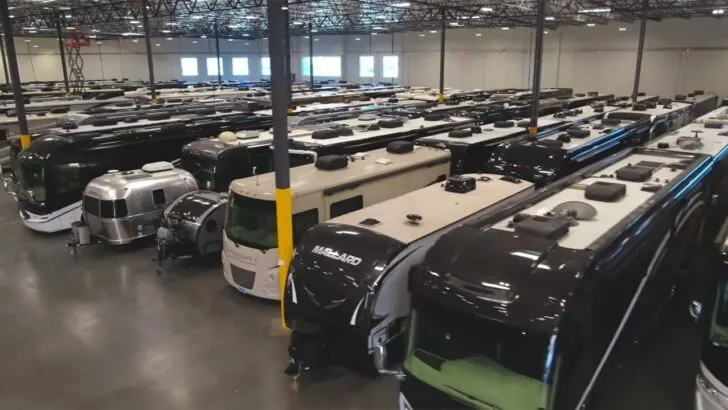
If you store your motorhome for part of the year, you can suspend or modify your insurance coverage to reflect the period of no use.
In all U.S. states, however, the only coverage required for motorhomes is minimum liability coverage. That means you need to maintain coverage for bodily injury and property damage liability. In addition, many states also require uninsured or underinsured insurance (we’ll explain more about this later).
In addition to these requirements, motorhome owners can choose from various types of insurance to add to their coverage. These would also reflect usage: for example, whether you use the motorhome recreationally or full time as we do.
As with auto insurance, you might opt to include collision, coverage for uninsured or underinsured motorists (whether it’s required or not), comprehensive coverage, or towing insurance. And as you might expect, the more coverage you choose, the more your insurance premium will cost.
With motorhome insurance, you can choose certain RV-specific options such as campsite coverage, roof protection, and pest protection. (No, that’s not protection from lousy drivers – it covers damage from insects, birds, and rodents and is generally not offered to owners of older motorhomes.)
But typically, unlike auto insurance, motorhome insurance is divided into the two categories of recreational and full-timer’s insurance. So if you don’t intend to live in your motorhome full time as we do, recreational insurance will cover you (inside and outside) when you’re on the road or when you’re parked at a campsite.
Those of us who use our motorhomes as our primary residences may add coverages similar to those found in a homeowner’s insurance policy, such as personal liability and loss.
And as with any insurance, the cost also comes down to risk assessment. For example, based on your demographic and experience, how likely are you to file a claim? What would it cost to replace or repair your motorhome? What type of rig are you driving? How will you use it?
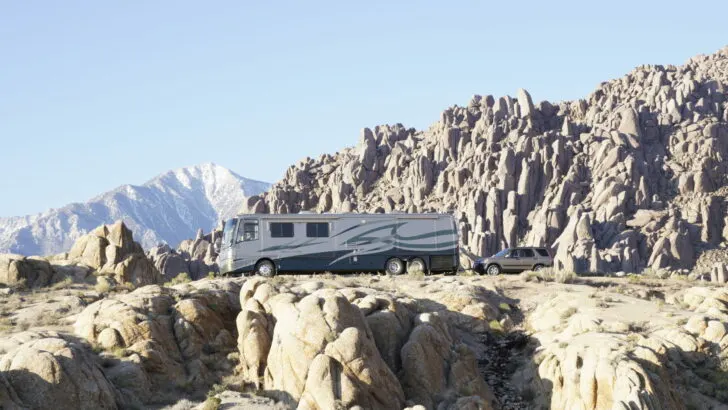
Motorhome insurance costs also reflect how you intend to use your motorhome. For example, will you visit local campgrounds for a few months a year, or will you travel without limitations all year long as we do?
Depending on the insurance company, you may also choose various options such as total loss replacement coverage, campsite and vacation coverage, emergency expenses, and roadside assistance and towing.
Are You Required to Buy Motorhome Insurance?
Yes. In all 50 US states and all Canadian provinces, if the RV is going to be on the road, you must have at least the required minimum for liability coverage (for bodily injury and property damage). In addition, many states/provinces also require uninsured or underinsured insurance. And since a Class A, B, or C motorhome is a vehicle, you must have separate vehicle coverage in addition to your car insurance. (This is not the case for a travel trailer.)
What is the Cost of Motorhome Insurance?
Motorhome insurance rates vary based on several factors, including the class of the motorhome you’re insuring. For example, campervan insurance cost is less than insurance for a Class A diesel pusher.
You’ll also pay less to insure a motorhome you’ll be using for the summer months at campgrounds in your home state than you will for a motorhome you’ll be living and traveling in full time.
As with auto insurance, your age and driving record will factor in, as will the options you choose to add to your coverage.
But here’s the surprise: in most cases, you’ll pay less for motorhome insurance than you will for regular auto insurance. Again, this is dependent on the coverage you choose, how you’ll use the rig, and the motorhome you’re insuring as well as a few other factors. But many people think that motorhome insurance costs are likely to be astronomical, and that’s generally not the case.
According to the National Automobile Dealers Association (NADA), the average insurance premium for a gas-powered Class A motorhome is around $1,000-$1,300 annually, based on 140 days of use per year. However, for a Class A diesel pusher (the highest-end luxury RV), depending on age/value, options, and frequency of use can cost $2,000 or more annually.
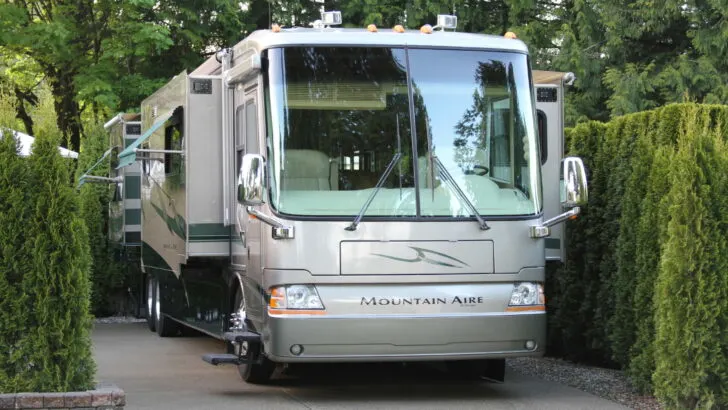
Class A diesel pushers are among the most expensive RVs to buy – and to insure.
A Class B motorhome (sometimes referred to as a camper van) is the smallest of the three motorhome classes. This category also includes conversion vans. Depending on the age/value of the motorhome and a number of individual factors, annual motorhome insurance costs for Class B RVs can vary anywhere from around $300 up to $1,000.
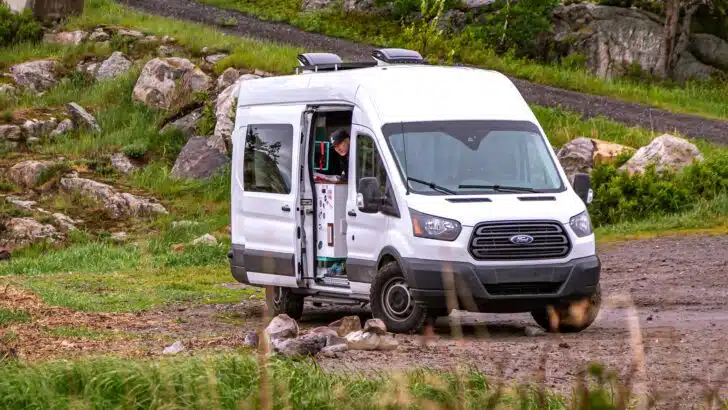
Class B RVs, also known as camper vans, are generally the least expensive motorhomes to insure.
Class C RVs are the middle child of motorhomes. Annual premiums on Class C motorhomes are generally in the neighborhood of $600 to $1000 depending on the age/value of the vehicle, state/province where it’s being insured, age of the driver, and frequency of use.
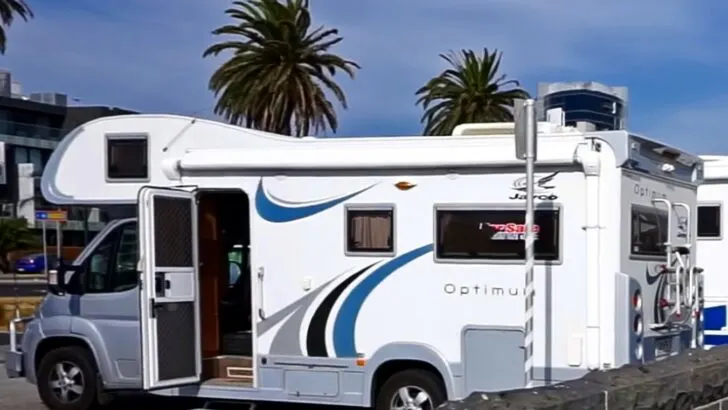
Class C motorhomes fall in the middle of Class A and Class B rigs in terms of size and motorhome insurance cost.
What Does Motorhome Insurance Actually Cover?
Bodily injury and property damage liability
This is the only motorhome coverage required by law in many locales. This liability coverage would include injuries or damage you cause while driving your motorhome, including legal fees necessary due to an accident.
Other types of coverage might include:
Medical
This covers medical bills (up to your chosen limits) for you and your passengers should you be in an accident, regardless of whose fault the accident is.
Uninsured/underinsured property damage and bodily injury
Some states require this coverage which applies if you’re hit by an uninsured or underinsured motorist, meaning that they couldn’t pay for the damages they caused. This insurance would cover your injuries and damages up to your policy’s limits.
Physical damage
There are two types of physical damage coverage.
- Comprehensive covers your motorhome in the event of theft, acts of nature, vandalism, windshield damage, and such things as rocks kicked up by other vehicles or if you should strike a large animal causing damage to your motorhome.
- Collision covers damage due to an accident, regardless of fault.
Both types of physical damage coverage involve a deductible, and the lower the deductible you choose, the more this coverage will cost.
Again, you can choose to add specific coverage such as roof and pest coverage, campsite liability insurance, and emergency coverage – but it’s important to note that motorhome insurance does not cover such things as damage from mold, rot, and fungi. Damages from earthquakes and floods are also rarely covered.
Keep in mind, too, that you’ll want to compare motorhome insurance from several different carriers before deciding. What may, at first glance, seem like a good deal could end up being a nightmare when you discover that your “low cost” insurance plan is really just cheap motorhome insurance… with “cheap” applying to the quality of coverage, not the cost.
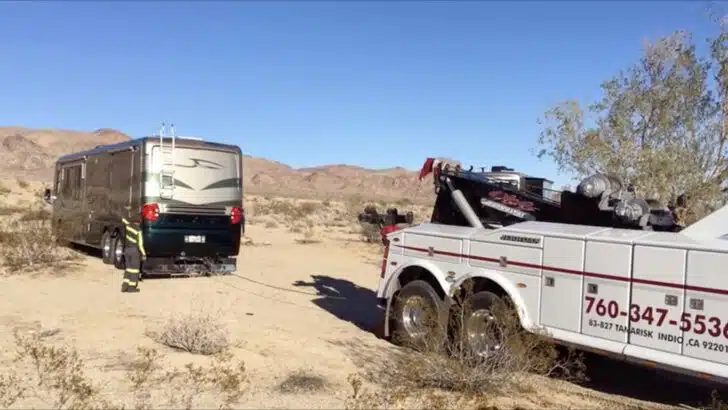
In addition to satisfying state requirements for insurance, you can opt for additional coverage such as emergency roadside assistance.
How Much Motorhome Insurance Do You Actually Need?
You actually need motorhome insurance that fulfills your state requirements. As previously noted, all U.S. states & Canadian provinces require liability insurance (bodily injury and property damage), and some require coverage for uninsured or underinsured motorists. Beyond these requirements, how much additional insurance coverage you choose is up to you.
Clearly, a motorhome is a significant investment that requires protection, and you may wish to consider additional insurance coverage so that your investment is adequately protected in the event of an accident or incident. In many cases, it’s a lot easier to afford annual insurance premiums than the replacement cost for a new RV should something bad happen to yours.
But another option, if you don’t use your RV all that much, could be to look for shorter-term coverage. You may need to keep some basic level of coverage in place to insure you from loss of the RV while it’s being stored, but for use, you may be able to get weekly motorhome insurance (or weekly camper insurance) just for the period(s) of time you actually have the RV out on the road. Check with your insurance broker to see what options they can provide.
Is Buying Motorhome Insurance Worth the Cost?
Buying motorhome insurance is definitely worth the cost, bearing in mind that the cost is different for everyone.
First, you’re very likely required to have liability (and possibly other) insurance, so there’s that. But beyond the required insurance is the wisdom of your home-on-wheels being adequately insured in case of damage, theft, vandalism, or any degree of accident, on or off the road.
Conclusion
A motorhome is a home we drive. It may be a full-time home or a part-time home. It may be a weekend home during the summer only. It may travel anywhere from thousands of miles a year or just a few hundred. But it’s a home containing our personal possessions, and it’s a vehicle sharing the road with a lot of other people – people who are distracted with a lot on their minds, changing lanes with phones and burgers in their hands. ????????????♂️
Accidents happen, and covering your investment is a reasonable endeavor, especially when motorhome insurance cost is a fairly insignificant expense relative to the cost of the motorhome.
Geek Out with Us Every Week
Join our newsletter to learn about all things RV-related. Every week we offer free tips, tricks, product reviews, and more to our online community of RVers. So whether this is your first time on the road or you’re a seasoned expert, we’d love for you to geek out with us!


Low green
Saturday 29th of July 2023
Send me all your tricks... please and thankyou
Nancy
Thursday 8th of December 2022
Upon being insured by my provider, she asked what the value was. I said 3 times I didn't know. She said: what 500?, 1000$? Basing it on what I paid for it, which was far from what it was worth. When I left there I was put in a position to look the value up myself?? Shouldn't my provider do that for me??? Isn't that what I pay them for?? My van burnt a week later and they gave me $1,250 minus the 300$ deductible. So I got $950 for my motorhome that was worth between $6,995 being the lowest and $12,000 being the average... what can I do to have my provider take responsibility?